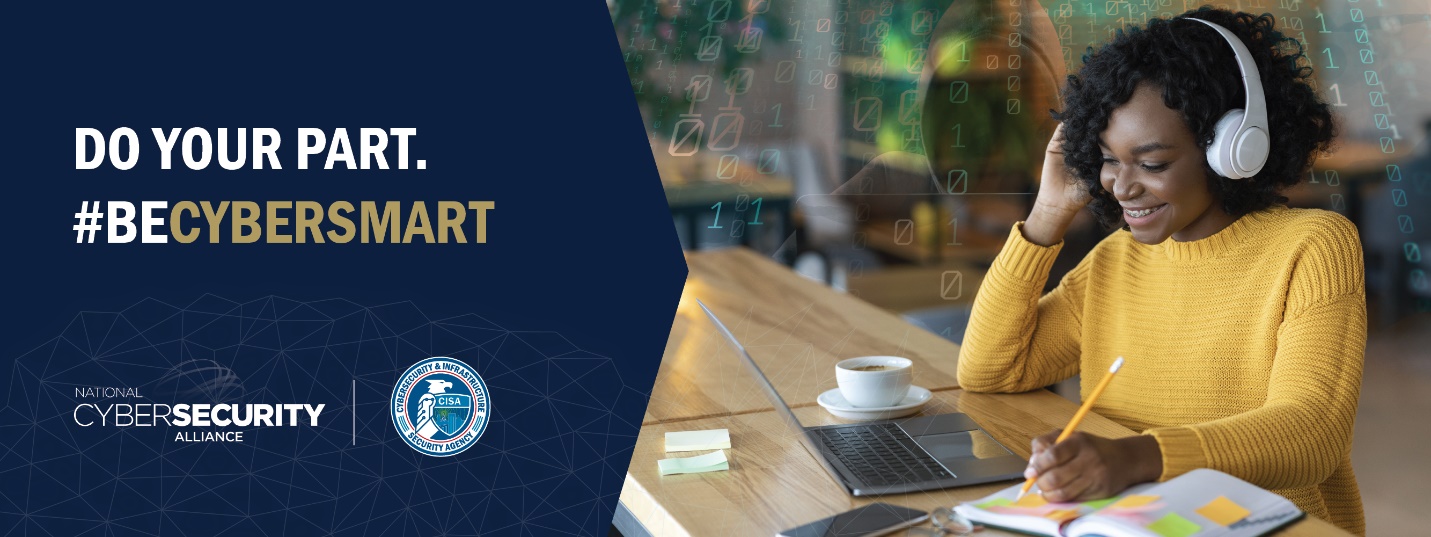National Cybersecurity Awareness Month Toolkit

During National Cybersecurity Awareness Month (NCSAM), the following tip sheets and resources are invaluable tools for reducing cybersecurity risks and protecting yourself online. Use these resources in your communities and share them with your stakeholders throughout the year to encourage strong, nationwide cybersecurity.
NCSAM Tip Sheets
Protecting Your Digital Home
More and more of our home devices—including thermostats, door locks, coffee machines, and smoke alarms—are now connected to the Internet. This enables us to control our devices on our smartphones, no matter our location, which in turn can save us time and money while providing convenience and even safety. These advances in technology are innovative and intriguing, however they also pose a new set of security risks. #BeCyberSmart to connect with confidence and protect your digital home.
Internet of Things
Now more than ever, consumers spend increasing amounts of time on the Internet. With every social media account you sign up for, every picture you post, and status you update, you are sharing information about yourself with the world. How can you be proactive and “Do Your Part. #BeCyberSmart”? Take these simple steps to connect with confidence and safely navigate the social media world.
Identity Theft and Internet Scams
Today’s technology allows us to connect around the world, to bank and shop online, and to control our televisions, homes, and cars from our smartphones. With this added convenience comes an increased risk of identity theft and Internet scams. #BeCyberSmart on the Internet—at home, at school, at work, on mobile devices, and on the go.
Phishing
Phishing attacks use email or malicious websites to infect your machine with malware and viruses in order to collect personal and financial information. Cybercriminals attempt to lure users to click on a link or open an attachment that infects their computers, creating vulnerability to attacks. Phishing emails may appear to come from a real financial institution, e-commerce site, government agency, or any other service, business, or individual. The email may also request personal information such as account numbers, passwords, or Social Security numbers. When users respond with the information or click on a link, attackers use it to access users’ accounts.
Multi-Factor Authentication
Have you noticed how often security breaches, stolen data, and identity theft are consistently front-page news these days? Perhaps you, or someone you know, are a victim of cyber criminals who stole personal information, banking credentials, or more. As these incidents become more prevalent, you should consider using multi-factor authentication, also called two-factor authentication. By applying these principles of verification to more of your personal accounts, such as email, social media, and more, you can better secure your information and identity online!
Passwords
Creating a strong password is an essential step to protecting yourself online. Using long and complex passwords is one of the easiest ways to defend yourself from cybercrime. No citizen is immune to cyber risk, but #BeCyberSmart and you can minimize your chances of an incident.
Online Privacy
The Internet touches almost all aspects of our daily lives. We are able to shop, bank, connect with family and friends, and handle our medical records all online. These activities require you to provide personally identifiable information (PII) such as your name, date of birth, account numbers, passwords, and location information. #BeCyberSmart when sharing personal information online to reduce the risk of becoming a cybercrimes victim.
Social Media Cybersecurity
Now more than ever, consumers spend increasing amounts of time on the Internet. With every social media account you sign up for, every picture you post, and status you update, you are sharing information about yourself with the world. How can you be proactive and “Do Your Part. #BeCyberSmart”? Take these simple steps to connect with confidence and safely navigate the social media world.
E-Skimming
The Internet touches almost all aspects of our daily lives. We are able to shop, bank, connect with family and friends, and handle our medical records all online. These activities require you to provide personally identifiable information (PII) such as your name, date of birth, account numbers, passwords, and location information. #BeCyberSmart when sharing personal information online to reduce the risk of becoming a cybercrimes victim.